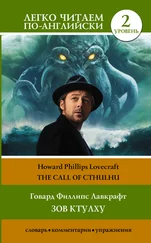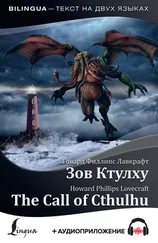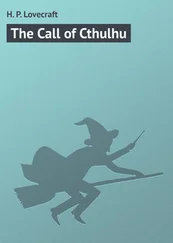Howard Lovecraft - The Call of Cthulhu
Здесь есть возможность читать онлайн «Howard Lovecraft - The Call of Cthulhu» весь текст электронной книги совершенно бесплатно (целиком полную версию без сокращений). В некоторых случаях можно слушать аудио, скачать через торрент в формате fb2 и присутствует краткое содержание. Жанр: Ужасы и Мистика, на английском языке. Описание произведения, (предисловие) а так же отзывы посетителей доступны на портале библиотеки ЛибКат.
- Название:The Call of Cthulhu
- Автор:
- Жанр:
- Год:неизвестен
- ISBN:нет данных
- Рейтинг книги:3 / 5. Голосов: 1
-
Избранное:Добавить в избранное
- Отзывы:
-
Ваша оценка:
- 60
- 1
- 2
- 3
- 4
- 5
The Call of Cthulhu: краткое содержание, описание и аннотация
Предлагаем к чтению аннотацию, описание, краткое содержание или предисловие (зависит от того, что написал сам автор книги «The Call of Cthulhu»). Если вы не нашли необходимую информацию о книге — напишите в комментариях, мы постараемся отыскать её.
The Call of Cthulhu — читать онлайн бесплатно полную книгу (весь текст) целиком
Ниже представлен текст книги, разбитый по страницам. Система сохранения места последней прочитанной страницы, позволяет с удобством читать онлайн бесплатно книгу «The Call of Cthulhu», без необходимости каждый раз заново искать на чём Вы остановились. Поставьте закладку, и сможете в любой момент перейти на страницу, на которой закончили чтение.
Интервал:
Закладка:
Meanwhile no more must be told. There was a secret which even torture could not extract. Mankind was not absolutely alone among the conscious things of earth, for shapes came out of the dark to visit the faithful few. But these were not the Great Old Ones. No man had ever seen the Old Ones. The carven idol was great Cthulhu, but none might say whether or not the others were precisely like him. No one could read the old writing now, but things were told by word of mouth. The chanted ritual was not the secret — that was never spoken aloud, only whispered. The chant meant only this: "In his house at R'lyeh dead Cthulhu waits dreaming."
Only two of the prisoners were found sane enough to be hanged, and the rest were committed to various institutions. All denied a part in the ritual murders, and averred that the killing had been done by Black Winged Ones which had come to them from their immemorial meeting-place in the haunted wood. But of those mysterious allies no coherent account could ever be gained. What the police did extract, came mainly from the immensely aged mestizo named Castro, who claimed to have sailed to strange ports and talked with undying leaders of the cult in the mountains of China.
Old Castro remembered bits of hideous legend that paled the speculations of theosophists and made man and the world seem recent and transient indeed. There had been aeons when other Things ruled on the earth, and They had had great cities. Remains of Them, he said the deathless Chinamen had told him, were still be found as Cyclopean stones on islands in the Pacific. They all died vast epochs of time before men came, but there were arts which could revive Them when the stars had come round again to the right positions in the cycle of eternity. They had, indeed, come themselves from the stars, and brought Their images with Them.
These Great Old Ones, Castro continued, were not composed altogether of flesh and blood. They had shape — for did not this star-fashioned image prove it? — but that shape was not made of matter. When the stars were right, They could plunge from world to world through the sky; but when the stars were wrong, They could not live. But although They no longer lived, They would never really die. They all lay in stone houses in Their great city of R'lyeh, preserved by the spells of mighty Cthulhu for a glorious surrection when the stars and the earth might once more be ready for Them. But at that time some force from outside must serve to liberate Their bodies. The spells that preserved them intact likewise prevented Them from making an initial move, and They could only lie awake in the dark and think whilst uncounted millions of years rolled by. They knew all that was occurring in the universe, for Their mode of speech was transmitted thought. Even now They talked in Their tombs. When, after infinities of chaos, the first men came, the Great Old Ones spoke to the sensitive among them by moulding their dreams; for only thus could Their language reach the fleshly minds of mammals.
Then, whispered Castro, those first men formed the cult around tall idols which the Great Ones shewed them; idols brought in dim eras from dark stars. That cult would never die till the stars came right again, and the secret priests would take great Cthulhu from His tomb to revive His subjects and resume His rule of earth. The time would be easy to know, for then mankind would have become as the Great Old Ones; free and wild and beyond good and evil, with laws and morals thrown aside and all men shouting and killing and revelling in joy. Then the liberated Old Ones would teach them new ways to shout and kill and revel and enjoy themselves, and all the earth would flame with a holocaust of ecstasy and freedom. Meanwhile the cult, by appropriate rites, must keep alive the memory of those ancient ways and shadow forth the prophecy of their return.
In the elder time chosen men had talked with the entombed Old Ones in dreams, but then something happened. The great stone city R'lyeh, with its monoliths and sepulchres, had sunk beneath the waves; and the deep waters, full of the one primal mystery through which not even thought can pass, had cut off the spectral intercourse. But memory never died, and the high-priests said that the city would rise again when the stars were right. Then came out of the earth the black spirits of earth, mouldy and shadowy, and full of dim rumours picked up in caverns beneath forgotten sea-bottoms. But of them old Castro dared not speak much. He cut himself off hurriedly, and no amount of persuasion or subtlety could elicit more in this direction. The size of the Old Ones, too, he curiously declined to mention. Of the cult, he said that he thought the centre lay amid the pathless desert of Arabia, where Irem, the City of Pillars, dreams hidden and untouched. It was not allied to the European witch-cult, and was virtually unknown beyond its members. No book had ever really hinted of it, though the deathless Chinamen said that there were double meanings in the Necronomicon of the mad Arab Abdul Alhazred which the initiated might read as they chose, especially the much-discussed couplet:
That is not dead which can eternal lie,
And with strange aeons even death may die.
Legrasse, deeply impressed and not a little bewildered, had inquired in vain concerning the historic affiliations of the cult. Castro, apparently, had told the truth when he said that it was wholly secret. The authorities at Tulane University could shed no light upon either cult or image, and now the detective had come to the highest authorities in the country and met with no more than the Greenland tale of Professor Webb.
The feverish interest aroused at the meeting by Legrasse's tale, corroborated as it was by the statuette, is echoed in the subsequent correspondence of those who attended; although scant mention occurs in the formal publications of the society. Caution is the first care of those accustomed to face occasional charlatanry and imposture. Legrasse for some time lent the image to Professor Webb, but at the latter's death it was returned to him and remains in his possession, where I viewed it not long ago. It is truly a terrible thing, and unmistakably akin to the dream-sculpture of young Wilcox.
That my uncle was excited by the tale of the sculptor I did not wonder, for what thoughts must arise upon hearing, after a knowledge of what Legrasse had learned of the cult, of a sensitive young man who had dreamed not only the figure and exact hieroglyphics of the swamp-found image and the Greenland devil tablet, but had come in his dreams upon at least three of the precise words of the formula uttered alike by Esquimaux diabolists and mongrel Louisianans?. Professor Angell's instant start on an investigation of the utmost thoroughness was eminently natural; though privately I suspected young Wilcox of having heard of the cult in some indirect way, and of having invented a series of dreams to heighten and continue the mystery at my uncle's expense. The dream-narratives and cuttings collected by the professor were, of course, strong corroboration; but the rationalism of my mind and the extravagance of the whole subject led me to adopt what I thought the most sensible conclusions. So, after thoroughly studying the manuscript again and correlating the theosophical and anthropological notes with the cult narrative of Legrasse, I made a trip to Providence to see the sculptor and give him the rebuke I thought proper for so boldly imposing upon a learned and aged man.
Wilcox still lived alone in the Fleur-de-Lys Building in Thomas Street, a hideous Victorian imitation of seventeenth century Breton Architecture which flaunts its stuccoed front amidst the lovely olonial houses on the ancient hill, and under the very shadow of the finest Georgian steeple in America, I found him at work in his rooms, and at once conceded from the specimens scattered about that his genius is indeed profound and authentic. He will, I believe, some time be heard from as one of the great decadents; for he has crystallised in clay and will one day mirror in marble those nightmares and phantasies which Arthur Machen evokes in prose, and Clark Ashton Smith makes visible in verse and in painting.
Читать дальшеИнтервал:
Закладка:
Похожие книги на «The Call of Cthulhu»
Представляем Вашему вниманию похожие книги на «The Call of Cthulhu» списком для выбора. Мы отобрали схожую по названию и смыслу литературу в надежде предоставить читателям больше вариантов отыскать новые, интересные, ещё непрочитанные произведения.
Обсуждение, отзывы о книге «The Call of Cthulhu» и просто собственные мнения читателей. Оставьте ваши комментарии, напишите, что Вы думаете о произведении, его смысле или главных героях. Укажите что конкретно понравилось, а что нет, и почему Вы так считаете.





